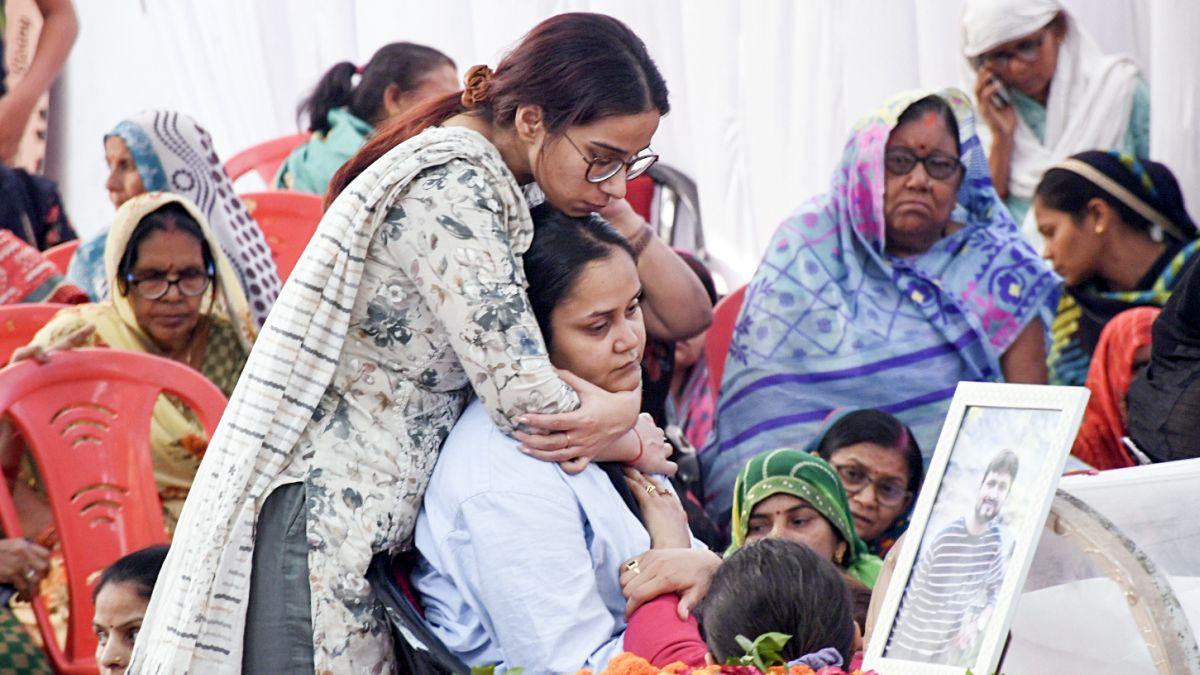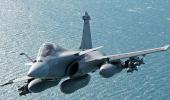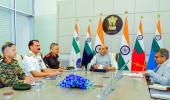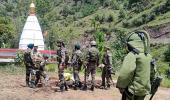'That is why I'm extremely concerned when India says that every terrorist incident in future from Pakistan will be treated as an act of war.'

India's recent assertion that every future cross-border terrorist attack will be treated as an act of war -- and its continued invocation of 'zero terrorism' as a national security goal -- reflects a dangerous shift in doctrine, argues Dr Ajai Sahni, Executive Director, Institute for Conflict Management in the second part of this interview with Prasanna D Zore/Rediff.
Such positions, he warns, hand disproportionate power to small groups of terrorists and set India up for strategic missteps.
Pakistan has claimed that its air force shot down a couple of Indian jets. How credible do you find these assertions? And did such a narrative influence India's decision to agree to the ceasefire?
I have no possible way of judging this outside the public statements by both sides. If you see the analyses being given by technical people internationally, they do not believe that any judgment can be arrived at in terms of the publicly known information, which is contentious on both sides.
The other thing is that merely the outcome of one or two exchanges or dogfights cannot give you adequate grounds for judgment of a technology. These confrontations are a combination of technology and skill.
I don't think, at least publicly, we will ever be in a position to know. The people who are directly involved will know where and why this happened. There will certainly be inquiries. There will be determinations of the vulnerabilities of this technology. But that is an issue to which I certainly will not be privy.
How does the intelligence failure to prevent the Pahalgam terrorist attack and India's response to it through Operation Sindoor and then the abrupt and sudden ceasefire with Pakistan reflect on Prime Minister Modi's leadership?

First of all, I don't believe that the attack reflects any extraordinary intelligence failure.
If 100 percent intelligence is always to be available on every possible terrorist attack, there would be no terrorism.
Terrorists will always find vulnerabilities as long as there is the intent. Sometimes they will be able to hit small targets. Sometimes they will be able to get bigger fatalities.
Every terrorist incident is engineered by people who seek the largest number of fatalities. Whether or not they will be realised is a matter of the confluence of a number of factors, including sheer chance.
I will give you the example of the Reasi incident last year in June where you had a busload of pilgrims -- more than 50 pilgrims -- attacked.
The bus fell into a gorge. The terrorists did not follow the bus into the gorge. They continued to fire on the bus.
As many as 42 people suffered bullet injuries, but the total fatality toll eventually was nine. That could have been a much larger incident.
So I don't think Pahalgam should be taken as the paradigm of an extraordinary failure. You will continue to have such incidents.
You will continue to have terrorist incidents, especially targeting civilians, because you cannot protect every civilian everywhere. Now you may harden the security around various tourist spots.
There was definitely a security lapse because such a large movement of tourists with absolutely no security in a terrorist-affected region does raise some questions, and I think a security lapse has been conceded.
But I don't regard it as a particular intelligence failure because, as I said, tomorrow you will have all your tourist areas under security cover, they'll go and find some isolated village and kill another 20 people over there. What will you do then?
You can't have a security detail attached to every settled or transient human concentration. And even if you do, at some point of time or the other, there will be a breach that will allow terrorists to hit someone.
It may be produced from negligence. It may just be a structural factor in terms of terrain, in terms of particular environments, in terms of factors that are purely chance.
So we need to understand that we have to take terrorism into account. And that is why I'm extremely concerned when India says that every terrorist incident in future from Pakistan will be treated as an act of war.
You cannot put so much power into the hands of groups of 2, 3, 4 terrorists that they can drag a nation of 150 crore people into war every time a terrorist action is executed. I think that was an unwise statement.
Has India shot itself in the foot by saying so?
Absolutely. I think this is comparable and potentially worse than the statement of 'zero terrorism,' because you can't have zero terrorism.
No country in the world can have zero terrorism. And very certainly Jammu and Kashmir, which has a history of 35 years of terrorism with 16 years of high-intensity terrorism -- more than a thousand fatalities a year -- and suddenly you say we will have zero terrorism?
As long as even small pools of discontent domestically exist, as long as Pakistan continues to harbour its overall ambitions as far as its 'core issue' or 'jugular vein' are concerned, there will always be a residual potential for terrorist acts. So such statements are, I think, extremely unfortunate and they are designed for failure.
If you say 'zero terrorism,' for instance, it's just not possible. If even one terrorist incident, even a non-fatal terrorist incident occurs, your claim is proved false.
Now every time one person is killed in J&K and you know that the attackers come from across the border, you have to go to war with Pakistan or you have to launch another Operation Sindoor.
The commitment does not allow the flexibility that is required in terms of tactical and operational responses.










